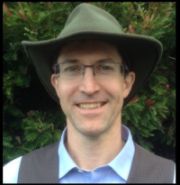MSc (University of Georgia, GA, USA), BSc (Virginia Polytechnic Institute and State University, VA, USA).
Email kelly.gragg@otago.ac.nz
Tel +64 3 479 7602
Room: Surveying building, 2nd floor, Room 208
Profile
Kelly graduated from Virginia Tech with a BSc in Geology in 1997 and worked for an environmental consulting firm in Virginia for three years where he conducted environmental investigative fieldwork at sites across the US. He obtained a MSc in Geology from the University of Georgia in 2003 with a focus on using shallow geophysics to locate archaeological features.
Kelly worked for a small R&D company, testing and engineering light detection and ranging (LIDAR) mobile mapping systems. He went on to work for a large engineering defense contractor conducting LIDAR collections and managing a LIDAR data processing team.
In 2013 he relocated to Auckland to work for the New Zealand Defense force as a geospatial data manager and joined the School of Surveying as a scientific officer in February 2016.
Kelly has lab coordination responsibilities for surveying papers. He also manages the micro computer lab, provides teaching support to students and staff, and manages the university's surveying software. In addition he also offers LIDAR and point cloud and data management research support for staff and students.
Teaching
- SURV120 Surveying and Spatial Science (demonstrator)
- SURV130 People, Place and the Built Environment (lecturer/demonstrator)
- SURV201 Surveying Methods (demonstrator)
- SURV203 Land Development Engineering 1 (demonstrator)
- SURV204 Land Development Engineering 2 (demonstrator)
- SURV207 Cadastral Surveying 1 (demonstrator)
- SURV208 Introduction to Geographic Information Systems (lecturer)
- SURV298 Introductory Field Course (demonstrator)
- SURV299 Second Year Field Course (demonstrator)
- SURV303 Urban Design 1 (demonstrator)
- SURV304 Land Development Engineering 3 (demonstrator)
- SURV319 Spatial Analysis and Programming (lecturer)
- SURV322 Hydrographic Surveying (demonstrator)
- SURV399 Third Year Field Course (demonstrator)
- SURV452 Hydrographic Surveying 2 (lecturer)
- SURV459 Engineering Surveying (demonstrator)
Research and professional interests
- Vulnerability of the Ross Ice Shelf in a Warming World (NZARI interdisciplinary and multi-institutional programme)
- LIDAR Collection and Point Cloud Processing
- Geospatial Data Lifecycle
- Data Management and Metadata Standards
- Development and Design of Data Collection Methodology
- Development of Light Board
Responsibilities
- Survey Software Laboratory Manager
- Surveying Software Instruction
- Research Support
- Teaching Support
Professional activities
Awards and achievements
- 2022 University of Otago Staff Award: Health, Safety and Wellbeing Award (Team)
Memberships
- Member Survey and Spatial New Zealand, 2016 – Present (http://www.surveyspatialnz.org)
